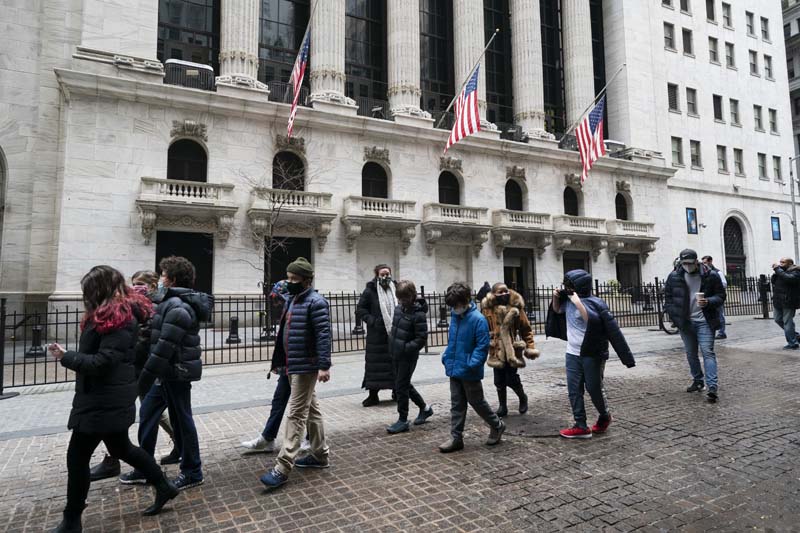

World shares fell on Wednesday as investors weighed the possibility that inflation might prompt central banks to adjust their ultra-low interest rate policies.
Investors increasingly are focusing on a big tick up in bond yields and how it affects stock valuations, analysts say.
The large amount of stimulus being pumped into economies has been a factor in pushing bond yields higher, giving some investors pause as it revives worries about inflation that have been nearly nonexistent for more than a decade.
Germany’s DAX rose 0.4% to 13,919.03 while the CAC 40 in France was nearly unchanged at 5,778.51. Britain’s FTSE 100 lost 0.7% to 6,581.90. US futures also were lower, with contracts for both the S&P 500 and the Dow industrials down 0.2%.
Federal Reserve Chair Jerome Powell told Congress Tuesday the Fed didn’t see a need to alter its policy of keeping interest rates ultra-low, noting that the economic recovery ‘remains uneven and far from complete’.
“Rising borrowing costs remain the prevalent issue on hand though Fed Powell’s dovish remarks had helped to arrest the fall for US equities on Tuesday,” Jingyi Pan of IG said in a commentary.
Hong Kong led the decline in Asia, losing 3% to 29,718.24 after the government announced it was raising the stamp tax on stock transactions to 0.13% from 0.1%. The increased revenue would help boost tax coffers as the government spends more to pull the economy out of its pandemic doldrums.
Tokyo’s Nikkei 225 shed 1.6% to 29,671.70. In Seoul, the Kospi skidded 2.5% to 2,994.98. Australia’s S&P/ASX 200 lost 0.9% to 6,777.80. The Shanghai Composite index gave up 2% to 3,564.08.
India’s Sensex bucked the regional trend, gaining 0.5% to 49,997.82.
Hong Kong’s government also announced pandemic relief measures worth $15.4 billion to help the territory recovery from the blow to its economy, which contracted 6.1% last year. The measures include loans for the unemployed, consumption vouchers and tax relief. Hong Kong Finance Minister Paul Chan forecast the economy is set to grow 3.5% to 5.5% this year.
The move to raise the tax on stock trading, the first in three decades, pulled shares in Hong Kong Exchanges & Clearing Ltd, which runs the bourse, down by as much as 12.4%. They closed 8.8% lower.
The yield on the 10-year Treasury note, which has climbed recently, was steady at 1.36% on Wednesday.
When bond yields rise, stock prices tend to be negatively impacted because investors turn an increasingly larger portion of their money toward the steadier stream of income that bonds provide.
A late-afternoon burst of buying on Wall Street on Tuesday helped reverse most of a tech-focused sell-off, nudging the S&P 500 to its first gain after a five-day losing streak.
The benchmark index eked out a 0.1% gain, to 3,881.37. The Dow Jones Industrial Average also rose 0.1%, to 31,537.35. The Nasdaq lost 0.5% to 13,465.20. The indexes were at all-time highs less than two weeks ago.
Smaller company stocks fell more than the broader market. The Russell 2000 small-cap index slid 0.9%, to 2,231.21. The index, the biggest gainer so far this year, clawed back from a 3.6% slide.
Since the pandemic began, investors have pushed prices of Big Tech stocks to stratospheric heights, betting that quarantined consumers would do most of their shopping online and spend more on devices and services for entertainment.
The bet mostly paid off. But the pandemic may be reaching its end stages, with millions of vaccines being administered each week in the US and across the globe now. It may cause consumers to return to their pre-pandemic habits.
More broadly, investors remain focused on the future of global economies badly hit by COVID-19 and the potential for more stimulus to fix them. The US House of Representatives is likely to vote on President Joe Biden’s proposed stimulus package by the end of the week. It would include $1,400 cheques to most Americans, additional payments for children, and billions of dollars in aid to state and local governments as well as additional aid to businesses impacted by the pandemic.
In other trading, US benchmark crude oil lost 27 cents to $61.40 per barrel in electronic trading on the New York Mercantile Exchange. It lost 3 cents on Tuesday to $61.67 per barrel. Brent crude, the international standard, lost 12 cents to $64.36 per barrel.
The US dollar rose to 105.67 Japanese yen from 105.24 yen late Tuesday. The euro climbed to $1.2166 from $1.2150.